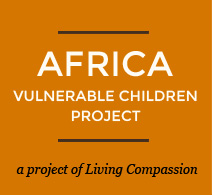The morning began with an early walk to town—a most special treat. The best way by far to experience Africa is on foot. In a car you are separate from the people, but on foot you become one of them. Everyone here walks. Every time we come back there are more cars on the road, but it is still the case that only a tiny percentage of the population can afford to transport themselves in that way. Everywhere you go, nearly all the time, people are walking on both sides of the road. They laugh and sing as they walk along, they meet acquaintances and stop to chat, and they buy the things they need from vendors along the way. There is a feeling of community in this that is striking to those of us who were raised to live in the isolating world of cars and televisions. Walking along with everyone else, the only white people in sight, we enjoy greeting people as if we belong there with them—because, we have realized, we do belong there with them. This was the decision we made when we first began our work in Ndola, that we were coming here to participate from within the community, rather than imposing something upon it from without. This is likely what makes us different from some other NGOs (non-government organizations) in the eyes of the people—we understand that we all are one.
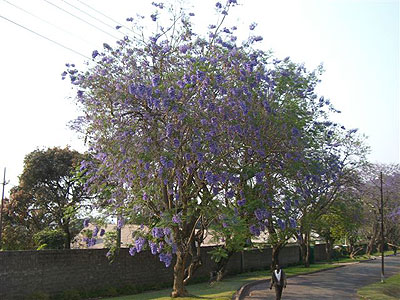
On the road near the guesthouse
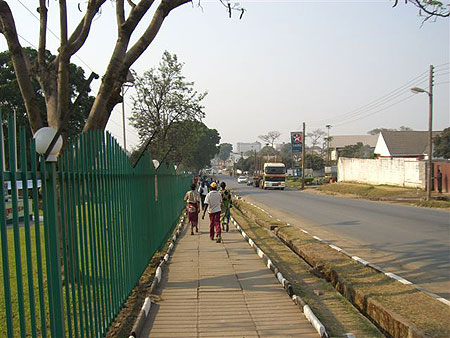
Nearing town
The first appointment was with Theresa at the passport office. We have an ambition to bring her to the States next year for our annual fundraiser, the Walk Across the Golden Gate Bridge (this year’s walk is happening soon, on October 4—don’t miss it!). There is a lot of red tape to untangle between now and then to make that happen, beginning with a passport, so we are getting started now.
Simon, our new taxi driver, was watching outside. One of the assignments for this trip was to find a reliable driver to replace our friend Muyunda, who disappeared mysteriously last year. It is likely we have him in Simon. He is a good man. Simon said that Theresa was still within.
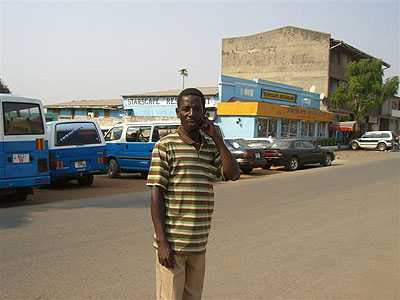
Simon
Theresa emerged from the passport office with the necessary forms. She will fill them out over the weekend and turn them in on Monday. We are told she will then need to wait two weeks for her passport to arrive. Nothing of this sort has ever been so easy in Ndola, but we are optimistic. Together we then drove across town, talking about America and what it is like there, to a photo shop, where Theresa got her passport photos made.
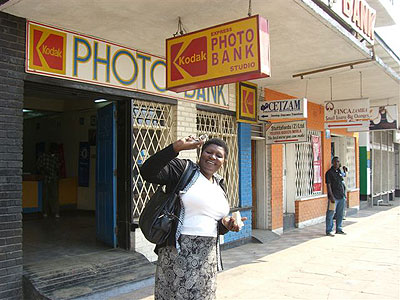
“I’m going to America!”
Meanwhile, we had arranged to meet with Gaudencia at a café in town. We are doing everything in our power to wrap up all the details of our building construction before the trip ends. It is extremely difficult to communicate about technical things of this nature from twelve thousand miles away; much better to get everything sorted out when we can actually look at the building and know we are talking about the same things. We spent an hour over coffee studying the plans and making our final decisions.
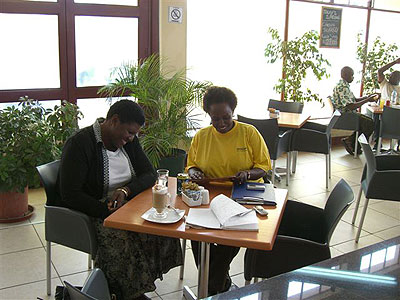
In the café with Theresa and Gaudencia
We then set our minds to buy metal sheets for two more of the houses we are roofing in Kantolomba. We are under some time pressure to get them finished, as the rains will begin in a little less than a month. We were hoping to have the materials at the site for the carpenters when they went back to work after lunch, but we were unsuccessful. We went to every hardware store in town, but nobody had the size we needed. Not at all surprised (this is life as usual in Africa), but a little frustrated, we decided to head out to Kantolomba to measure the houses in question and see what we should do.
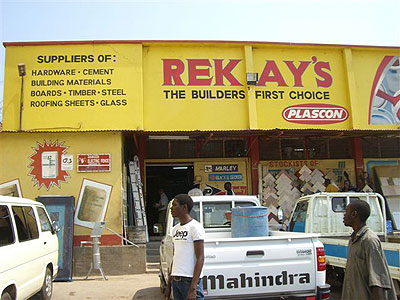
One of the local hardware stores.
When we arrived we found two people waiting for us. One was John, the man doing the plumbing work on our building. He had an estimate to hand over on the next phase of his job, and an unrelated offer. John told us that he has extensive training and experience teaching health-care basics to children. He volunteers for an NGO on the other side of the city, he said, and enjoys it very much. He offered to teach a health-care class once a week for the children of Kantolomba. We were touched by the offer. We have had so many experiences of generosity here! It is moving to see people selflessly offering to serve who themselves are struggling to survive. It could be this spirit more than anything else that inspires those of us in America in our own service. We are learning from them how to truly give.
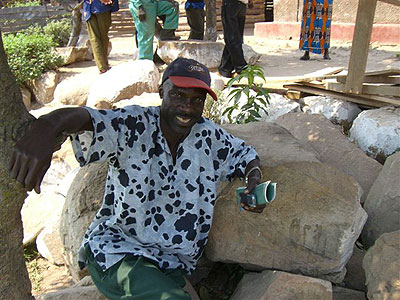
John, the plumber
Francis, the electrician, was waiting as well. We had phoned him earlier in order to set up a meeting to settle on his labor charge for the electrical work we want him to do. This took some doing, as it turned out. Our negotiations began in English but moved to Bemba when things started heating up. Nobody can bargain like an African, and no African, we have learned, can bargain like Theresa. It required a good ten minutes to arrive at a figure that everyone felt good about, but it was accomplished, finally, and the debate ended with smiles and congratulations. We agreed that Francis would begin the work on Monday, then we jumped in the taxi and headed to the market to buy the supplies.

Francis and the shop owner (Francis’s nephew)
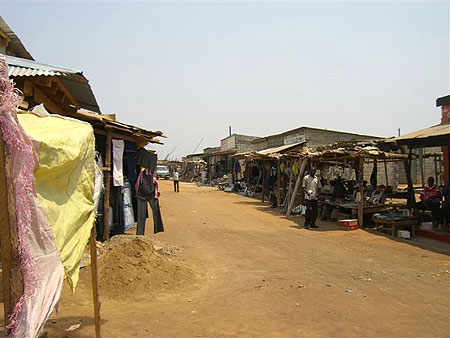
A view of Masala Market
It was two hours before we returned to Kantolomba. By then the afternoon was beginning to wane. Immediately we set off to find the carpenters so that we could resolve the complication around the roofing sheets. They were finishing the preparatory work at Regina’s house. It was a short piece of work to find a solution: we will use two short pieces instead of one long one, and overlap them, they said. We can pick them up Monday morning. Before we parted we stopped to pose for a group photo.
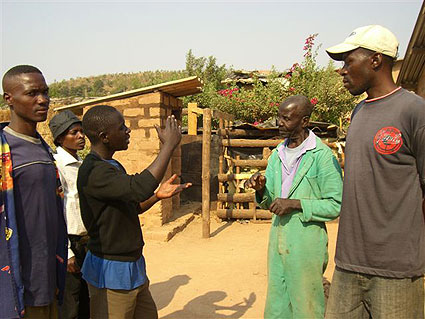
Evaristo and Pascal solve the roofing problem
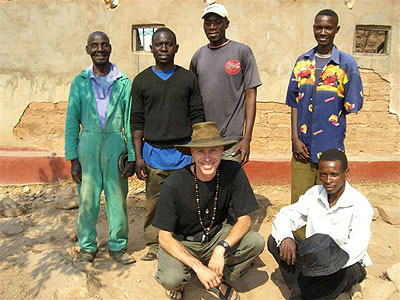
Dave and “the boys”
On the way back to the property we ran into Pauline. Pauline is one of our employees; she is out of work right now, however, because she has just had a baby girl. We stopped to chat with her for a moment. Pauline seemed shy, as if she had something important she wanted to tell Theresa. She said something quietly in Bemba, then Theresa began dancing, singing, shouting happily in two languages, and celebrating in all sorts of other beautiful ways. Amazed, we asked what was going on. “She has named the girl ‘Theresa,’ after me!” Theresa said.
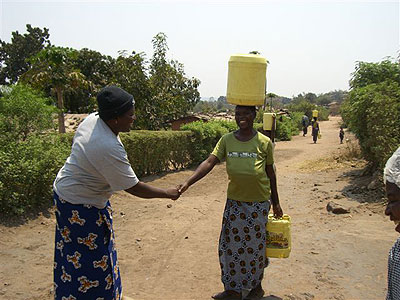
Theresa and Pauline celebrate “little Theresa”
We were delighted, but not at all surprised. Theresa is a jewel. The more we get to know her the more she commands our respect and admiration. She is as strong and solid as a mountain. Everyone here loves her—that’s clear. They are also indebted to her for their lives, many of them. She carries the entire project on her shoulders. It is her energy that keeps everything moving and holds the whole possibility together. If nothing more had come from our efforts here than to create a space for Theresa to discover the person that she is, it all would have been worth it. And, of course, much more than just this has happened. All the women who are involved, and now the men as well, have the same opportunity to find out who they are without the burden of extreme poverty. It’s going to be fun to see what they do with this over time.
Back at the property we learned that the tailors had finished the handbags—all 325 of them! This was cause for more singing and dancing. It is one of the best benefits of being with the women in Kantolomba, that they sing and dance over every happy thing. We decided we would test one of the bags to see if it was strong enough. Georgina filled one with bricks, then swung it round and round. Others took a turn with it also, and bounced it up and down, trying to break it, while the women laughed. They were not able to tear even a stitch. We all agreed that the bags are very strong, and then celebrated some more.
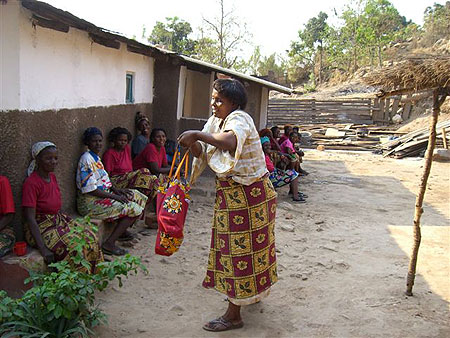
Georgina tests one of the handbags
After that we drove to the guesthouse with their singing still in our ears. It is good that we are so happy.
